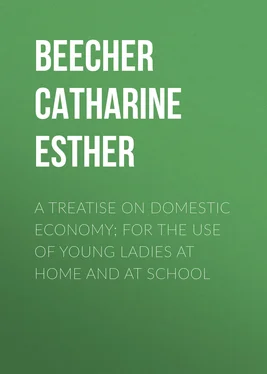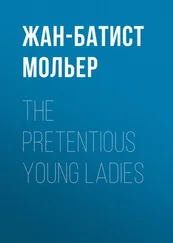Catharine Beecher - A Treatise on Domestic Economy; For the Use of Young Ladies at Home and at School
Здесь есть возможность читать онлайн «Catharine Beecher - A Treatise on Domestic Economy; For the Use of Young Ladies at Home and at School» — ознакомительный отрывок электронной книги совершенно бесплатно, а после прочтения отрывка купить полную версию. В некоторых случаях можно слушать аудио, скачать через торрент в формате fb2 и присутствует краткое содержание. Жанр: personal_finance, foreign_home, на английском языке. Описание произведения, (предисловие) а так же отзывы посетителей доступны на портале библиотеки ЛибКат.
- Название:A Treatise on Domestic Economy; For the Use of Young Ladies at Home and at School
- Автор:
- Жанр:
- Год:неизвестен
- ISBN:нет данных
- Рейтинг книги:3 / 5. Голосов: 1
-
Избранное:Добавить в избранное
- Отзывы:
-
Ваша оценка:
- 60
- 1
- 2
- 3
- 4
- 5
A Treatise on Domestic Economy; For the Use of Young Ladies at Home and at School: краткое содержание, описание и аннотация
Предлагаем к чтению аннотацию, описание, краткое содержание или предисловие (зависит от того, что написал сам автор книги «A Treatise on Domestic Economy; For the Use of Young Ladies at Home and at School»). Если вы не нашли необходимую информацию о книге — напишите в комментариях, мы постараемся отыскать её.
A Treatise on Domestic Economy; For the Use of Young Ladies at Home and at School — читать онлайн ознакомительный отрывок
Ниже представлен текст книги, разбитый по страницам. Система сохранения места последней прочитанной страницы, позволяет с удобством читать онлайн бесплатно книгу «A Treatise on Domestic Economy; For the Use of Young Ladies at Home and at School», без необходимости каждый раз заново искать на чём Вы остановились. Поставьте закладку, и сможете в любой момент перейти на страницу, на которой закончили чтение.
Интервал:
Закладка:
But there is one peculiarity of situation, in regard to American women, which makes this delicacy of constitution still more disastrous. It is the liability to the exposures and hardships of a newly-settled country.
One more extract from De Tocqueville will give a view of this part of the subject, which any one, familiar with Western life, will admire for its verisimilitude.
"The same strength of purpose which the young wives of America display in bending themselves, at once, and without repining, to the austere duties of their new condition, is no less manifest in all the great trials of their lives. In no country in the world, are private fortunes more precarious, than in the United States. It is not uncommon for the same man, in the course of his life, to rise and sink again through all the grades which lead from opulence to poverty. American women support these vicissitudes with a calm and unquenchable energy. It would seem that their desires contract, as easily as they expand, with their fortunes. The greater part of the adventurers, who migrate, every year, to people the Western wilds, belong" "to the old Anglo-American race of the Northern States. Many of these men, who rush so boldly onward in pursuit of wealth, were already in the enjoyment of a competency in their own part of the Country. They take their wives along with them, and make them share the countless perils and privations, which always attend the commencement of these expeditions. I have often met, even on the verge of the wilderness, with young women, who, after having been brought up amid all the comforts of the large towns of New England, had passed, almost without any intermediate stage, from the wealthy abode of their parents, to a comfortless hovel in a forest. Fever, solitude, and a tedious life, had not broken the springs of their courage. Their features were impaired and faded, but their looks were firm: they appeared to be, at once, sad and resolute."
In another passage, he gives this picturesque sketch: "By the side of the hearth, sits a woman, with a baby on her lap. She nods to us, without disturbing herself. Like the pioneer, this woman is in the prime of life; her appearance would seem superior to her condition: and her apparel even betrays a lingering taste for dress. But her delicate limbs appear shrunken; her features are drawn in; her eye is mild and melancholy; her whole physiognomy bears marks of a degree of religious resignation, a deep quiet of all passion, and some sort of natural and tranquil firmness, ready to meet all the ills of life, without fearing and without braving them. Her children cluster about her, full of health, turbulence, and energy; they are true children of the wilderness: their mother watches them, from time to time, with mingled melancholy and joy. To look at their strength, and her languor, one might imagine that the life she had given them had exhausted her own; and still she regrets not what they have cost her. The house, inhabited by these emigrants, has no internal partition or loft. In the one chamber of which it consists, the whole family is gathered for the night. The dwelling is itself a little world; an ark of civilization amid an ocean of foliage. A hundred steps beyond it, the primeval forest spreads its shades, and solitude resumes its sway."
Such scenes, and such women, the writer has met, and few persons realize how many refined and lovely women are scattered over the broad prairies and deep forests of the West; and none, but the Father above, appreciates the extent of those sacrifices and sufferings, and the value of that firm faith and religious hope, which live, in perennial bloom, amid those vast solitudes. If the American women of the East merit the palm, for their skill and success as accomplished housekeepers, still more is due to the heroines of the West, who, with such unyielding fortitude and cheerful endurance, attempt similar duties, amid so many disadvantages and deprivations.
But, though American women have those elevated principles and feelings, which enable them to meet such trials in so exemplary a manner, their physical energies are not equal to the exertions demanded. Though the mind may be bright and firm, the casket is shivered; though the spirit may be willing, the flesh is weak. A woman of firm health, with the hope and elasticity of youth, may be envied rather than pitied, as she shares with her young husband the hopes and enterprises of pioneer life. But, when the body fails, then the eye of hope grows dim, the heart sickens, the courage dies; and, in solitude, weariness, and suffering, the wanderer pines for the dear voices and the tender sympathies of a far distant home. Then it is, that the darkest shade is presented, which marks the peculiar trials and liabilities of American women, and which exhibits still more forcibly the disastrous results of that delicacy of constitution which has been pointed out. For, though all American women, or even the greater part of them, are not called to encounter such trials, yet no mother, who rears a family of daughters, can say, that such a lot will not fall to one of her flock; nor can she know which will escape. The reverses of fortune, and the chances of matrimony, expose every woman in the Nation to such liabilities, for which she needs to be prepared.
CHAPTER III.
REMEDIES FOR THE PRECEDING DIFFICULTIES
Having pointed out the peculiar responsibilities of American women, and the peculiar embarrassments which they are called to encounter, the following suggestions are offered, as remedies for such difficulties.
In the first place, the physical and domestic education of daughters should occupy the principal attention of mothers, in childhood; and the stimulation of the intellect should be very much reduced. As a general rule, daughters should not be sent to school before they are six years old; and, when they are sent, far more attention should be paid to their physical developement, than is usually done. They should never be confined, at any employment, more than an hour at a time; and this confinement should be followed by sports in the open air. Such accommodations should be secured, that, at all seasons, and in all weathers, the teacher can every half hour send out a portion of her school, for sports. And still more care should be given to preserve pure air in the schoolroom. The close stoves, crowded condition, and poisonous air, of most schoolrooms, act as constant drains on the health and strength of young children.
In addition to this, much less time should be given to school, and much more to domestic employments, especially in the wealthier classes. A little girl may begin, at five or six years of age, to assist her mother; and, if properly trained, by the time she is ten, she can render essential aid. From this time, until she is fourteen or fifteen, it should be the principal object of her education to secure a strong and healthy constitution, and a thorough practical knowledge of all kinds of domestic employments. During this period, though some attention ought to be paid to intellectual culture, it ought to be made altogether secondary in importance; and such a measure of study and intellectual excitement, as is now demanded in our best female seminaries, ought never to be allowed, until a young lady has passed the most critical period of her youth, and has a vigorous and healthful constitution fully established. The plan might be adopted, of having schools for young girls kept only in the afternoon; that their mornings might be occupied in domestic exercise, without interfering with school employments. Where a proper supply of domestic exercise cannot be afforded, the cultivation of flowers and fruits might be resorted to, as a delightful and unfailing promotive of pleasure and health.
And it is to that class of mothers, who have the best means of securing hired service, and who are the most tempted to allow their daughters to grow up with inactive habits, that their Country and the world must look for a reformation, in this respect. Whatever ladies in the wealthier classes decide shall be fashionable, will be followed by all the rest; but, while they persist in the aristocratic habits, now so common, and bring up their daughters to feel as if labor was degrading and unbecoming, the evils pointed out will never find a remedy. It is, therefore, the peculiar duty of ladies, who have wealth, to set a proper example, in this particular, and make it their first aim to secure a strong and healthful constitution for their daughters, by active domestic employments. All the sweeping, dusting, care of furniture and beds, the clear starching, and the nice cooking, should be done by the daughters of a family, and not by hired servants. It may cost the mother more care, and she may find it needful to hire a person for the express purpose of instructing and superintending her daughters, in these employments; but it should be regarded as indispensable to be secured, either by the mother's agency, or by a substitute.
Читать дальшеИнтервал:
Закладка:
Похожие книги на «A Treatise on Domestic Economy; For the Use of Young Ladies at Home and at School»
Представляем Вашему вниманию похожие книги на «A Treatise on Domestic Economy; For the Use of Young Ladies at Home and at School» списком для выбора. Мы отобрали схожую по названию и смыслу литературу в надежде предоставить читателям больше вариантов отыскать новые, интересные, ещё непрочитанные произведения.
Обсуждение, отзывы о книге «A Treatise on Domestic Economy; For the Use of Young Ladies at Home and at School» и просто собственные мнения читателей. Оставьте ваши комментарии, напишите, что Вы думаете о произведении, его смысле или главных героях. Укажите что конкретно понравилось, а что нет, и почему Вы так считаете.












